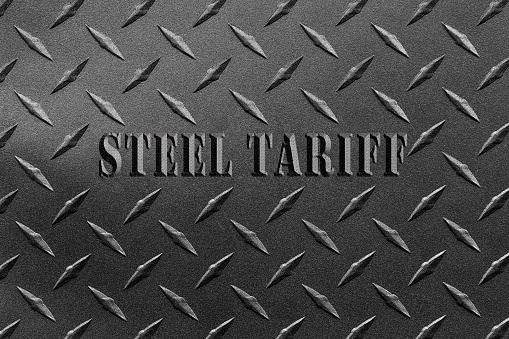Contributing Writer
- FMA
- The Fabricator
- FABTECH
- Canadian Metalworking
Categories
- Additive Manufacturing
- Aluminum Welding
- Arc Welding
- Assembly and Joining
- Automation and Robotics
- Bending and Forming
- Consumables
- Cutting and Weld Prep
- Electric Vehicles
- En Español
- Finishing
- Hydroforming
- Laser Cutting
- Laser Welding
- Machining
- Manufacturing Software
- Materials Handling
- Metals/Materials
- Oxyfuel Cutting
- Plasma Cutting
- Power Tools
- Punching and Other Holemaking
- Roll Forming
- Safety
- Sawing
- Shearing
- Shop Management
- Testing and Measuring
- Tube and Pipe Fabrication
- Tube and Pipe Production
- Waterjet Cutting
Industry Directory
Webcasts
Podcasts
FAB 40
Advertise
Subscribe
Account Login
Search
Lawmakers call for changes in tariff exclusion process
Some worry that small companies are at a disadvantage when making plea for exemptions
- By Stephen Barlas
- August 3, 2018

The appeals process for U.S. manufacturers to be excluded from the steel and aluminum tariffs is not being run efficiently, according to some Congressional lawmakers.
Pressure is building from both sides of the aisle in Congress to fix the steel tariff exclusion process.
Congressional members are calling on the U.S. Department of Commerce to stabilize what the House Ways and Means Committee’s Subcommittee on Trade Chairman Dave Reichert, R-Wash., called the “burdensome, unwieldy, and inefficient” exclusion process used by the department to consider requests for exemptions from President Donald Trump’s 25 percent steel and aluminum tariffs. By the end of July, 27,000 requests for exclusions had been made; only 700 had been considered and only 266 accepted. There is no appeals process for denied applications.
The entire application process itself discriminates against smaller metalworking companies, according to Reichert, because of the costs, which large companies can afford more easily than smaller companies. Reichert said the Commerce Department has made some improvements in the process—but argued the exclusion process is “bogged down in red tape.”
Richard D. Huether, president and CEO, Independent Can Co., said his company has spent over $50,000 internally for staff to prepare 40 exclusions.
“This represents over 500 hours, which could have been time spent building the business versus defending the business,” he told the trade subcommittee on July 24. “We would like the department to issue exclusions covering ranges of dimensions with the same Harmonized Tariff Schedule (HTS) code, allowing trade associations like CMI [Can Manufacturers Institute] to apply for exclusions on behalf of the industry and granting product exclusions due to specialized needs like those in the can manufacturing industry.”
Reichert endorsed that suggestion.
At those same hearings, Todd Adams, president of Sanitube LLC, a small Florida manufacturer of stainless steel tube, valves, and fittings primarily used in the food and beverage processing industry, related multiple horror stories about troubles his company had had getting the Commerce Department Bureau of Industry and Security to accept its applications for exclusions because of alleged lack of information, including confidential information Sanitube initially declined to provide. The delays in the Commerce Department’s posting of the Sanitube applications meant that, once they were granted, Sanitube was ineligible for refunds for the tariffs “solely due to posting latency outside of Sanitube’s control,” according to Adams. The cost to the small company was $55,000.
Steel and aluminum tariff exclusions are granted if Commerce Department officials deem no domestic sources for the steel or aluminum are available and there are no overriding national security concerns with regard to the specific product. In some cases, U.S. Steel and Nucor, the big domestic steel manufacturers, post objections to exemption requests, which has riled some purchasers of foreign steel.
Delay and Potential Change to OSHA Beryllium Standard
The Occupational Safety and Health Administration (OSHA) has delayed the compliance deadline for a few of the “ancillary” requirements of the new beryllium exposure standard until Dec. 12. But between now and then, OSHA is likely to issue a proposed rule, possibly making some significant changes in those and possibly other requirements established in the last days of the Obama administration.
Business groups have assailed parts of the standard, although not the new permissible exposure limits (PELs). The “ancillary standards” delay affects work areas and regulated areas, written exposure control plans, personal protective equipment, hygiene areas and practices, housekeeping, hazard communication, and recordkeeping.
The hazard communications portion of the beryllium standard, for example, includes specific labeling requirements. Manufacturers, importers, and employers are still obligated to label hazardous chemicals containing beryllium, ensure that safety data sheets are readily available, and train workers on the hazards of beryllium.
subscribe now

The Fabricator is North America's leading magazine for the metal forming and fabricating industry. The magazine delivers the news, technical articles, and case histories that enable fabricators to do their jobs more efficiently. The Fabricator has served the industry since 1970.
start your free subscriptionAbout the Author

Stephen Barlas
- Stay connected from anywhere

Easily access valuable industry resources now with full access to the digital edition of The Fabricator.

Easily access valuable industry resources now with full access to the digital edition of The Welder.

Easily access valuable industry resources now with full access to the digital edition of The Tube and Pipe Journal.
- Podcasting
- Podcast:
- The Fabricator Podcast
- Published:
- 04/16/2024
- Running Time:
- 63:29
In this episode of The Fabricator Podcast, Caleb Chamberlain, co-founder and CEO of OSH Cut, discusses his company’s...
- Trending Articles
Tips for creating sheet metal tubes with perforations

Supporting the metal fabricating industry through FMA

JM Steel triples capacity for solar energy projects at Pennsylvania facility

Are two heads better than one in fiber laser cutting?

Fabricating favorite childhood memories

- Industry Events
16th Annual Safety Conference
- April 30 - May 1, 2024
- Elgin,
Pipe and Tube Conference
- May 21 - 22, 2024
- Omaha, NE
World-Class Roll Forming Workshop
- June 5 - 6, 2024
- Louisville, KY
Advanced Laser Application Workshop
- June 25 - 27, 2024
- Novi, MI


























